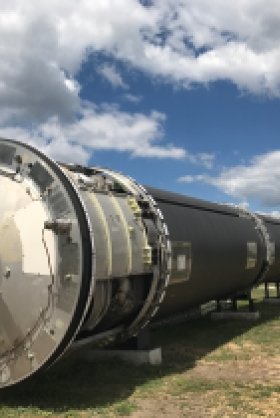Interpreting the Bomb: Ownership and Deterrence in Ukraine’s Nuclear Discourse




Image: The SS-18 ICBM, produced in Soviet Ukraine, on display at the Strategic Missile Forces Museum in Pervomaysk. Photo by Polina Sinovets.
Interpreting the Bomb: Ownership and Deterrence in Ukraine’s Nuclear Discourse
Nuclear deterrence thinking has become so entrenched in US academic and policy circles that it only seems natural that other states regard nuclear weapons in the same terms. Yet is it necessarily so? In this article, Polina Sinovets and Mariana Budjeryn examine the case of Ukraine to understand how its leaders interpreted the value of the nuclear weapons deployed on Ukrainian territory in 1990–1994.
Ukraine became the host of world’s third largest nuclear arsenal following the Soviet collapse in 1991. Its pre-independence intention to rid itself of nuclear weapons soon gave way to a more nuanced nuclear stance that developed into a claim of rightful nuclear “ownership.” Western security theories and practices led US leaders to assume that Ukraine sought to keep nuclear weapons as a deterrent against the growing Russian threat. Drawing on Ukrainian and US archival sources and interviews, Sinovets and Budjeryn reconstruct Ukrainian deliberations about the meaning of their nuclear inheritance and find that deterrence thinking was conspicuously lacking. Sinovets and Budjeryn's investigation demonstrates that deterrence thinking, far from being a “natural” or systemically determined way of regarding nuclear weapons, is a socially constructed and historically contingent set of concepts and practices.
Key words: Nuclear weapons, NPT, deterrence, Ukraine, disarmament
Click here to download the full paper.
Authors

Senior Research Associate, Project on Managing the Atom at the Harvard Kennedy School’s Belfer Center

Nuclear Proliferation International History Project
The Nuclear Proliferation International History Project is a global network of individuals and institutions engaged in the study of international nuclear history through archival documents, oral history interviews, and other empirical sources. Read more


History and Public Policy Program
A leader in making key foreign policy records accessible and fostering informed scholarship, analysis, and discussion on international affairs, past and present. Read more


Cold War International History Project
The Cold War International History Project supports the full and prompt release of historical materials by governments on all sides of the Cold War. Read more

Explore More
Browse Insights & Analysis
Call for Applications: Nuclear History Summer Camp 2025

Interviews on Civil Society and Nuclear Risk Reduction
